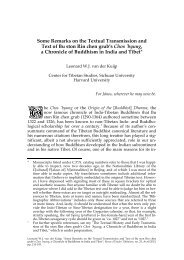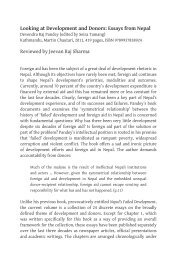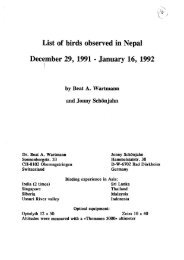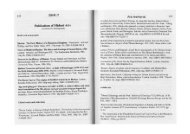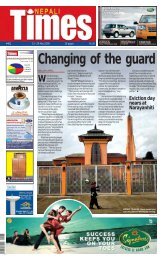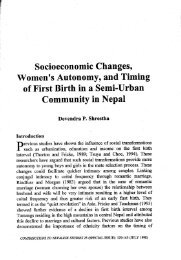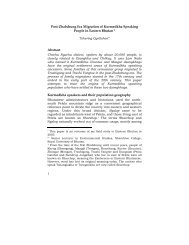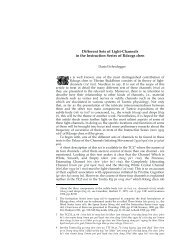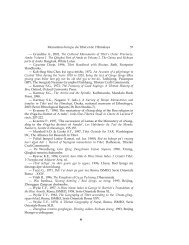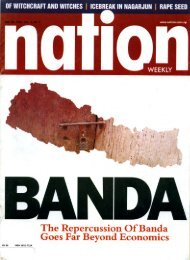Nepali Times - Digital Himalaya
Nepali Times - Digital Himalaya
Nepali Times - Digital Himalaya
Create successful ePaper yourself
Turn your PDF publications into a flip-book with our unique Google optimized e-Paper software.
14 ASIA 3 - 9 NOVEMBER 2000 NEPALI TIMES<br />
Taliban and Masood in peace talks<br />
○ ○ ○ ○ ○ ○ ○ ○ ○ ○ ○ ○ ○ ○ ○ ○ ○ ○ ○ ○ ○ ○ ○ ○ ○ ○<br />
○ ○ ○ ○ ○ ○ ○<br />
Geneva - The feuding parties in the Afghan civil war have repeatedly<br />
had confidential talks in Switzerland in 1999 and March this year.<br />
Representatives of the Taliban regime which is not internationally<br />
recognised and forces loyal to Ahmed Shah Masood had met in the<br />
Alpine republic. The meetings were organised by the Swiss foreign<br />
ministry, but failed to kick-start proper peace talks. The Swiss<br />
newspaper Le Temps reported Wednesday that a Taliban vice<br />
minister and a minister of Masood’s Northern Alliance had discussed<br />
heath care issues at a meeting in March in the presence of the<br />
International Committee of the Red Cross and United Nations representatives.<br />
”In an internal conflict like this one has to open up a contact and<br />
further dialogue between the parties which is often very difficult,<br />
Berne foreign ministry official Raimund Kunz told the paper. There has<br />
been renewed fighting in Afghanistan since last August when the<br />
Taliban, which rule 90 per cent of the country, launched a new<br />
offensive against Masood’s forces in the north. Last month alone<br />
some 28,000 people fled the war-torn and drought-stricken country to<br />
Pakistan. (dpa)<br />
Kuwait ends ban on Bangla workers<br />
○ ○ ○ ○ ○ ○ ○ ○ ○ ○ ○ ○ ○ ○ ○ ○ ○ ○ ○ ○ ○ ○ ○ ○ ○ ○<br />
○ ○ ○ ○ ○ ○ ○<br />
Kuwait City - Kuwait has agreed to end a bar on workers from<br />
Bangladesh, Bangladesh Prime Minister Sheikh Hasina said. Sheikh<br />
Hasina said her Labour Minister Abdul Mannan has signed an<br />
agreement with Kuwaiti officials on lifting the year-long restriction<br />
which was imposed after a Bangladeshi worker allegedly killed his<br />
Kuwaiti employer and then fled the emirate. Meanwhile, the two<br />
nations were discussing a draft extradition treaty that could affect the<br />
ongoing murder case, she told a press conference in Kuwait City at<br />
the end of a three-day visit. The labour bar “was lifted yesterday,”<br />
Sheikh Hasina said. She said that the original measure had been an<br />
administrative procedure and not an official ban.<br />
Kuwait had put a stop to processing work permits for<br />
Bangladeshis after the alleged killing. Sheikh Hasina said the suspect<br />
was in custody in Dhaka and that her government has been providing<br />
Kuwait with information about the case which is pending trial. ”If<br />
necessary” she said, Bangladesh was ready to send the suspect<br />
back to Kuwait.<br />
Further exchanges of information about the killing were needed,<br />
however, and a proposed extradition treaty still had to be enacted.<br />
Bangladesh and Kuwait officials discussed the shaping of a mutual<br />
extradition law during her visit, Sheikh Hasina added. Registered<br />
workers from Bangladesh in Kuwait number about 160,000 but some<br />
estimates of the total have been put at around 200,000. Most are<br />
unskilled and are among the lowest paid labourers in the Gulf. The<br />
ending of the bar was expected to increase badly needed income<br />
sent home by Bangladeshis annually. (dpa)<br />
Narmada activists begin final battle<br />
○ ○ ○ ○ ○ ○ ○ ○ ○ ○ ○ ○ ○ ○ ○ ○ ○ ○ ○ ○ ○ ○ ○ ○ ○ ○ ○<br />
○ ○ ○ ○ ○ ○<br />
New Delhi - A week after India’s Supreme Court rejected their<br />
case against the Narmada dam, activists opposing the scheme have<br />
begun what may well be the final battle by the country’s best known<br />
people’s movement. Famed anti-Narmada dam campaigner, Medha<br />
Patkar, entered the tenth day of her hunger protest Thursday in the<br />
city of Bhopal, the capital of central Madhya Pradesh state. The state<br />
is the home of most of the quarter million, mainly indigenous people to<br />
be displaced by the four billion-U.S. dollar Sardar Sarovar dam. For<br />
well over a decade, Patkar, who has won the Swedish ‘Right to<br />
Livelihood Award’, also described as the alternative Nobel Prize, has<br />
led hundreds of anti-dam rallies, been beaten up and arrested several<br />
times by the police. She almost died of dehydration, during a similar<br />
22-day hunger protest nine years ago.<br />
Patkar’s protest has been accompanied by a series of public<br />
demonstrations against the court ruling, held across the country as<br />
well as in North America, West Europe and South Africa. The Sardar<br />
Sarovar, being built in the western coastal state of Gujarat, adjoining<br />
Madhya Pradesh, is to be the first of 30 big and hundreds of medium<br />
and small dams planned on the Narmada, which flows westward<br />
across central India into the Arabian Sea.<br />
While the NBA’s campaign is backed by a number of well-known<br />
personalities like famous Indian author Arundhati Roy, the pro-dam<br />
lobby does not lack for big names. These include former top journalist<br />
B.G. Verghese and prominent development economist Yogendra<br />
Alagh, a former federal government minister. (IPS)<br />
Indonesia military feels pinch<br />
○ ○ ○ ○ ○ ○ ○ ○ ○ ○ ○ ○ ○ ○ ○ ○ ○ ○ ○ ○ ○ ○ ○ ○ ○ ○ ○ ○<br />
○ ○ ○ ○ ○<br />
Jakarta - Recent attempts by parts of Indonesia’s military to<br />
flex its political muscle are a challenge not just to President<br />
Abdurrahman Wahid, but to the country’s bumpy transition to democracy.<br />
Since becoming president a year ago, Wahid has taken several<br />
steps to assert civilian rule over the military—a major lever of political<br />
power for more than 30 years during Suharto’s presidency.<br />
Among others, Wahid has replaced many high-ranking military<br />
officials known to be Suharto loyalists, moved to cut the soldiers’<br />
influence at the village level and told them clear their actions with<br />
civilian authorities. But getting the military to accept the changes in<br />
political culture brought by the end of the Suharto era has not been<br />
easy. Juwono Sudarsono, former minister of defence under Wahid’s<br />
administration, warns that civilian politicians must seriously develop<br />
the democratisation process in the country. ‘’If they fail to set up a<br />
democratic political system, the military then will make a comeback,’’<br />
Sudarsono, a political professor at University of Indonesia, was<br />
quoted by local media as saying earlier this month. ‘’So, civilian leaders<br />
must set up a political system that paves the way for civilian supremacy,’’<br />
he said. (IPS)<br />
Uttaranchal’s birth pangs<br />
A new Indian state will be born after a six-year campaign, but the real problems lie ahead.<br />
RANJIT DEVRAJ IN NEW DELHI<br />
T○ ○ ○ ○ ○ ○ ○ ○ ○ ○ ○ ○ ○ ○<br />
○ ○<br />
he forthcoming ‘addition’ of<br />
a new province to India to<br />
be carved out of the central<br />
<strong>Himalaya</strong>n foothills in northern Uttar<br />
Pradesh state, will satisfy a decadesold<br />
demand of the hill folk in that<br />
region. Uttaranchal will be one of the<br />
three new Indian states to be born on<br />
that day, which are being created out<br />
of three big states—Uttar Pradesh, its<br />
eastern neighbour Bihar and Madhya<br />
Pradesh to its south.<br />
While the setting up of<br />
Uttaranchal, with a population of<br />
about eight million people, marks the<br />
success of a six-year-old mass<br />
campaign, a tough job awaits the<br />
rulers of the new state. Their goal is to<br />
tackle a unique form of underdevelopment.<br />
1.2 billion and counting<br />
This mother of all censuses is China’s fifth. Under scrutiny will be the one child norm, believed to be<br />
responsible for a hidden 200 million—China’s “black population”.<br />
ANTOANETA BEZLOVA IN BEIJING<br />
Uttaranchal<br />
has one of India’s<br />
highest levels of<br />
adult literacy and<br />
education, but<br />
decades of neglect<br />
are blamed for the<br />
continuing<br />
downhill migration<br />
of residents from a<br />
region that still has<br />
a subsistence<br />
farming-based<br />
economy. It was<br />
this feeling of being<br />
neglected by the<br />
federal government and the rulers of<br />
Uttar Pradesh based in the distant state<br />
capital Lucknow that had fired the<br />
demand for a new state. Its picturesque<br />
river valleys, flanked by snow<br />
topped mountains, make tourism a<br />
major source of income for the region,<br />
but not much has been done to<br />
develop this in ways to benefit the local<br />
economy. Uttaranchal, with its major<br />
<strong>Himalaya</strong>n rivers, also has tremendous<br />
potential to generate hydro-electricity,<br />
but this is not easy in the highly seismic<br />
and ecologically fragile mountain<br />
region. Fruit and flower cultivation also<br />
offers much scope for job and income<br />
generation. However, Uttaranchal<br />
continues to be a ‘money-order’<br />
economy, where generations of male<br />
migrants have supported families back<br />
home with monthly postal remittances<br />
○ ○ ○ ○ ○ ○ ○ ○ ○ ○ ○ ○ ○ ○ ○ ○ ○ ○ ○ ○ ○ ○ ○ ○ ○ ○ ○ ○ ○ ○ ○ ○<br />
○ T○ he Chinese government will begin facing up to the hidden millions who<br />
have eluded its “one child” policy on family planning, as it embarks Nov 1<br />
on the largest population census undertaken anywhere in the world. An<br />
army of six million census workers will knock on doors throughout the country<br />
next month, carrying out a 500 million yuan ($60 million) plan to count the<br />
number of people in a country home to one-sixth<br />
of the world’s population.<br />
This will be China’s fifth national census, but<br />
the first in which census workers will be equipped<br />
with computing devices. Hoping to get an<br />
accurate picture of China’s population, the<br />
government has promised households who have<br />
not registered their “out of planning quota”<br />
children to apply for permanent residence during<br />
the census. Beijing claims that its draconian<br />
family-planning policy launched in 1980 had<br />
succeeded in lowering the population growth rate<br />
by one percent a year in the 1990s. Last month,<br />
the China Youth Daily said the “one child” policy<br />
was responsible for preventing 250 million births<br />
in the past 20 years. The policy stipulates that<br />
each couple living in the cities should have only<br />
one child, unless one or both of the couple are<br />
from an ethnic minority or they are both the only<br />
children. In most rural areas, a couple may have a<br />
second child after a break of several years.<br />
Yet despite the policy’s strict rules, family<br />
planning targets have been loosely enforced in<br />
many of the poorest regions. Nowadays it is common to find couples in the<br />
countryside—where 80 percent of the population live—with five, six or even<br />
more children. In the 1980s, local officials often forced couples to undergo<br />
sterilisation or abortion, and if a couple exceeded its quota of one or two<br />
children, officials might confiscate property or levy a heavy fine. But in recent<br />
years, family planning authorities have halted coercive measures and called for a<br />
more flexible approach in the countryside.<br />
As a result, many rural couples have learned to get around the law by<br />
sending the pregnant woman to stay with relatives until the baby is born, or<br />
claiming the newborn baby was adopted or belongs to a friend or relative.<br />
This loose enforcement of birth quotas, combined with the traditional<br />
Chinese preference for boys, has led to a population explosion in rural areas.<br />
According to official statistics, China’s population reached 1.259 billion at the<br />
end of last year. However, some demographers believe that as many as 200<br />
from the big cities in the plains of<br />
India.<br />
The creation of the new state is<br />
expected to result in better attention<br />
to these priorities. But that will have<br />
to wait for the resolution of political<br />
problems that have cropped up even<br />
before Uttaranchal is born. Many<br />
among those who agitated for a<br />
separate home for the hill people are<br />
now complaining of serious flaws in<br />
the administrative shape of the new<br />
state. They are unhappy with the<br />
decision to make the major hill town<br />
of Dehradun, some 250 km north of<br />
the Indian capital, the ‘interim capital’<br />
of Uttaranchal.<br />
The problem has arisen because<br />
Uttaranchal is made up of the two<br />
culturally different sub-regions of<br />
Garhwal and Kumaon. Dehradun is<br />
part of the former. The relatively<br />
obscure, but strategically located town<br />
of Gairsen, which straddles the<br />
Garhwal and Kumaon areas, has long<br />
been suggested as a ‘compromise’<br />
capital. “There is too much uncertainty<br />
over vital issues,” says Harish<br />
Rawat of the Uttarakhand Sanyukt<br />
Sangharsh Samiti, one of the groups<br />
which campaigned for the new state.<br />
There are also fears that the kind<br />
of development promised by the<br />
politicians may lead to further<br />
environmental damage to the<br />
hills. Studies have found that socalled<br />
development work in the area<br />
has only worsened environmental<br />
degradation, adding to women’s work,<br />
by making them walk longer to fetch<br />
fuel wood and water. According to<br />
Sachidananda Bharati of the<br />
Dudhatoli Lok Vikas Sansthan, a<br />
people’s group working in<br />
Uttaranchal, the continuing<br />
neglect of the hills has hurt<br />
women the most. The migration<br />
of men to the plains has meant<br />
not only loneliness for the women<br />
but also forces them to take up<br />
hard physical work on farms.<br />
The creation of a new state is<br />
also expected to draw in more real<br />
estate developers from India’s big<br />
cities. In recent years, property<br />
developers from the Indian capital<br />
have bought up picturesque hill<br />
slopes from local farmers to build<br />
holiday homes for rich people<br />
from the plains. “This racket is<br />
happening with the connivance of<br />
local level officials,” says Nathu<br />
Begum, the president of an elected<br />
village council in Dehradun<br />
district. Nobody is complaining<br />
too loudly because the racket is<br />
keeping land prices up, she adds.<br />
Demands have been raised that<br />
the new state follow the example<br />
of other <strong>Himalaya</strong>n states like<br />
adjoining Himachal Pradesh,<br />
which have strict laws, banning<br />
outsiders from buying local<br />
land. t (IPS)<br />
million people could be unaccounted for.<br />
Judging by the publicity accompanying the current census, it seems that the<br />
government is preparing to encounter the large number of extra people dubbed<br />
the “black population”. The government has appealed to people to co-operate<br />
with census-takers, and promises no illegal charges would be allowed during the<br />
population survey. “Information collected during this census would not be used<br />
to punish anyone for their past mistakes on<br />
population-related matters,” assures Zhang<br />
Weimin, director general of the State Statistical<br />
Bureau. He says each of the six million census<br />
workers recruited to carry out the registration has<br />
received special training. “They were told to be<br />
careful when asking questions which people feel<br />
might embarrass or endanger them,” explains<br />
Zhang.<br />
By some domestic media accounts though,<br />
when pilot interviews were carried out in the<br />
summer, many people refused even to open their<br />
doors to census officials. Even in the cities, where<br />
the “one child” policy has generally worked,<br />
people felt fearful about the census. “We don’t<br />
worry about having “black children” (unregistered<br />
children),” says Zhao Linzhi, a middle-aged<br />
Beijing woman who works with a foreign family<br />
as a domestic help. “But if census workers want<br />
to know about our income, this might get us into<br />
trouble with the tax authorities.”<br />
Zhang from the State Statistical Bureau<br />
admits that many economic elements have been<br />
added to this census’s questionnaire. “We want to know about employment and<br />
find out the number of people out of work,” he says. “We also want to know<br />
about the housing situation—this would help us determine the pace of housing<br />
reform.” “Yet we won’t be asking about income levels,” he promises. “We just<br />
hope to catch on the social welfare conditions of households.” To quell fears<br />
about the census, the government has launched a campaign to raise consciousness.<br />
In the run-up to the census, signs were posted throughout Beijing asking<br />
residents to faithfully report their family situations.<br />
During the 10-day census that starts Nov 1, census takers will work from<br />
door to door, visiting about 350 million households. Initial results would be<br />
announced in February next year. Zhang would not however comment on<br />
official estimates of the hidden population that has eluded previous census. “We<br />
will have to wait for the results and compare,” he says. “The central government<br />
expects that the figure in this census would be below 1.3 billion.” t (IPS)






